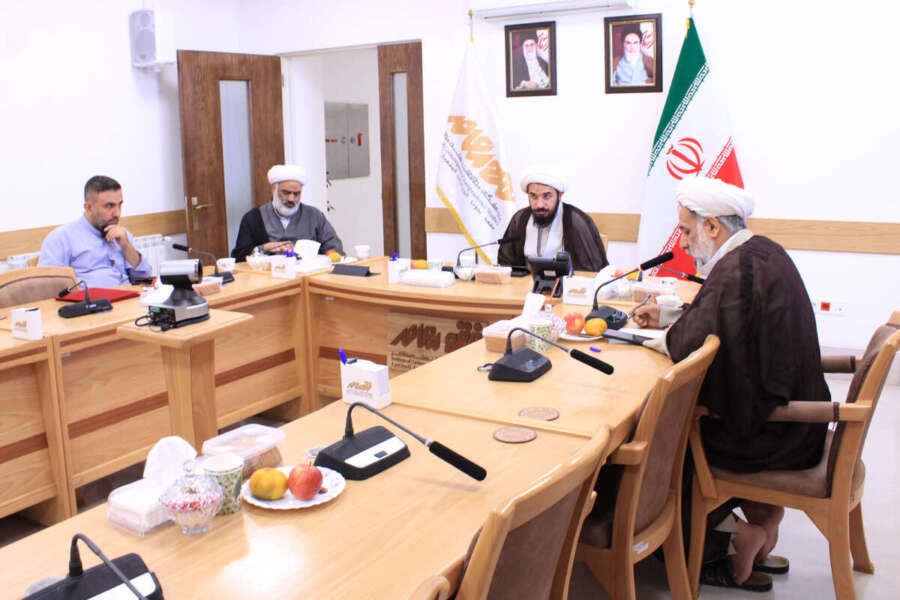Note: Hujjat al-Islam wal-Muslimeen Mohammad Motaqian Tabrizi and Mohammad Ghodbi in this session, by expressing the importance of examining the possibility and conditions of implementing laws, presented solutions for aligning laws with religious standards and the necessity of separating the role of the jurist and examined a historical example of changing the camel blood money fatwa in the early days of the Revolution.
According to the information base of the Research Institute of Contemporary Jurisprudence Studies, on Sunday, November 2, 2025, the 63rd session of the Methodology Sundays series was held with the topic “Examining Executive Considerations of Laws as a Method for Changing Laws Based on Islamic Standards.”
This scholarly session was held with the aim of explaining the methodology of legislative governance and aligning laws with Islamic standards and to provide a ground for practical and scholarly discussions in the field of law-making and implementation of Islamic laws, centered on examining executive considerations of laws.
At the beginning of the session, Hujjat al-Islam wal-Muslimeen Mohammad Kazem Haqqani Fazl, the scholarly secretary of the session and director of the Contemporary Jurisprudence Encyclopedia, while welcoming the attendees and offering condolences for the days of the martyrdom of Lady Siddiqa Tahira (peace be upon her), stated: “The autumn season of Method on Sundays is dedicated to legislation jurisprudence and law-making challenges. The goal of holding this series of sessions is to examine the methodology of changing and reforming laws while observing religious standards to provide a practical and scholarly understanding of the legislation process in the Islamic Republic.”
In continuation, Hujjat al-Islam wal-Muslimeen Mohammad Motaqian Tabrizi, director of the Legislation Jurisprudence Working Group of the Jurisprudential Center of the Pure Imams (peace be upon them), presented and examined the concepts of executive considerations of laws and considered it to include two levels: “principle of executability” and “conditions and executive factors.” He emphasized that examining executive considerations must be done before approving the law and added: “Executive considerations are not merely a method of change; rather, they must be considered from the law-drafting and initial design stage of laws so that the law has executability and alignment with sharia from the beginning.”
The director of the Legislation Jurisprudence Working Group of the Jurisprudential Center of the Pure Imams (peace be upon them) also explained: “Examining the possibility and conditions of implementing laws is like a method of writing law, not merely subsequent reform; this approach must be applied before approving the law in coordination with the jurisprudential domain, university, and executive system.”
In the critique section of the session, Hujjat al-Islam wal-Muslimeen Mohammad Ghodbi, director of the Art and Creative Industries Working Group of the Islamic Consultative Assembly’s Islamic Research Center, while appreciating the presenter and the value of the discussion topic, addressed the weaknesses and practical challenges of executive considerations and emphasized: “The main topic was well expressed and it seems the presented reasoning is completely documented and usable. However, the point that is in my opinion is focusing on presenting a model; a model that includes three steps: first step, identifying and discovering obstacles; second step, classifying and organizing obstacles; and third step, presenting to jurists for alignment or reform of fatwas.”
He, by expressing the necessity of separating executive considerations and the role of the jurist, added: “Executive considerations are in truth outside the work of the jurist. If we want to pay attention to executive considerations, we must present it to the lawmaker and the Expediency Discernment Assembly so that decisions are made considering implementation conditions. Changing fatwa occurs when executive considerations are very serious and presenting it to the jurist becomes necessary.”
Hujjat al-Islam wal-Muslimeen Ghodbi cited an example of this process as the change in fatwa in the early Revolution regarding paying human blood money based on camels and explained: “At that time, the amount of human blood money was determined based on a specific number of camels, but in practice paying blood money with camels was not possible. Therefore, this issue was presented to the jurists and considering the executive conditions of society, the fatwa was reformed to paying blood money based on the financial value of camels.”
The director of the Art and Creative Industries Working Group of the Islamic Consultative Assembly’s Islamic Research Center at the end emphasized: “If executive considerations are merely limited to changing law, this matter is common in all countries, but if it has a religious direction, the relation of executive considerations with religious standards must be clarified and classified and if necessary presented for fatwa.”
In continuation of the session, a section was dedicated to questions and answers and participants raised various topics including the role of executive considerations in changing laws, the position of the jurist in this process, and the method of documenting the connection between executive considerations and religious standards. The presenter and critic of the session explained that executive considerations are mainly considered in the initial design of the law and changing the principle of the law is only possible in the case of a serious executive obstacle and after jurisprudential examination. It was also emphasized that the connection between executive considerations and religious standards must be documented in the form of a three-stage model including identifying obstacles, classifying, and presenting to jurists so that the decision-making of the lawmaker and jurist is transparent and coordinated.
The 63rd “Method on Sundays” session was held with the presence of researchers, jurists, and those interested in legislation jurisprudence and participants benefited from the opportunity to interact with the presenter and critic. The key points raised in this session can be utilized in improving the country’s law-making processes.

